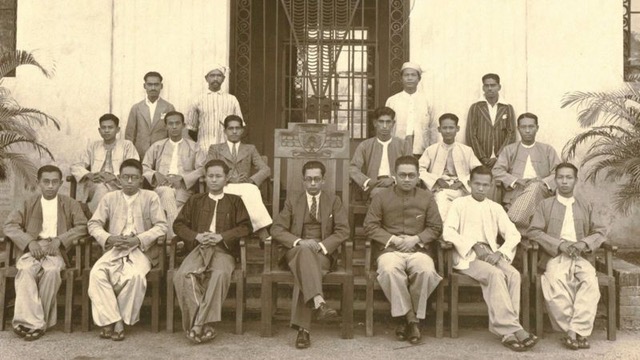Established in 1929 to promote campus life for students, the Rangoon University Student Union (RUSU) played a central role in the struggle for independence and in the fight against the military dictatorship.
Today, the building is a vacant site as the military regime led by General Ne Win dynamited it in 1962.
The RUSU was built in 1929, nine years after the establishment of Rangoon University, with 170,000 rupees funded by rice merchant U Nyo. The British governor, Sir Harcourt Butler, laid the foundation stone. Two years later, the two-story white building complete with a thick iron gate reading, “The Student Union Gift of U Nyo”, emerged near Inya Lake, the Thitpok Tree, Convocation Hall, University Library and University Hospital.
On the ground floor of the RUSU were a canteen, book shop and barber. On the upper floor were a meeting hall and library with book cabinets to the ceiling. There was also a hall where students could play billiards, ping-pong and lift weights.
Among the early members of the RUSU were those keen to impress the British rector to secure jobs in the Indian Civil Service (ICS) or British companies and those hoping to secure independence.
The election of the student union chair inside at the RUSU helped developed democratic practices. Social gatherings, fresher welcome, English-language debate and talks by legal experts, writers and politicians also helped widen the horizons of social and political knowledge of students. Graduates became well-known figures in literature, education, business, international relations, politics and military circles after independence in 1948.
The election of Ko Nu as the RUSU president in 1935 marked the beginning of its radical phase with Ko Nu, Ko Aung San, the then editor of the RUSU magazine ‘Oway’, and other student leaders taking charge of the RUSU executive committee. Anti-colonialism became the main topic for discussion in the library, barber’s and canteen. Students began to take part in politics outside the university and the building drew the attention of the colonial government.
When Ko Nu and Ko Aung San were expelled from the university in 1936 for opposing the university’s British authorities there was a second large-scale student protest which attracted support from members of the public.
Ko Nu, Ko Aung San and Ko Kyaw Nyein left the university and engaged in politics. Ko Ba Hein and Ko Ba Swe succeeded them and continued anti-colonial agitation from the RUSU. Student leader Ko Aung Kyaw was fatally injured when police carried out violent crackdowns on students who marched from the RUSU to the Secretariat to condemn the colonial education system. A monument built for him by students in front of the RUSU building still stands today.
As nationalism rose, secret meetings were held at the RUSU to push for armed struggle. However, World War II broke out and the RUSU was also occupied by British troops along with other Rangoon University buildings.

The RUSU fell to Japanese forces until the Allied forces returned in 1945 and students came back in 1947.
At the time, General Aung San, who was the chairman of RUSU, was the national leader. After his assassination, Ko Nu, who was also a chairman of the RUSU, became the independent country’s first prime minister.
Despite political factions during the era of Anti-Fascist People’s Freedom League, the RUSU continued to speak up for student rights, peace, democracy and human rights. Students expressed strong opposition when the caretaker government of Gen. Ne Win took power in 1958 and staged a coup in 1962.
On July 7, four months after the coup, a meeting was held to oppose the tighter hostel rules imposed by the military regime. No one thought it would be the last meeting to be held in the 32-year-old building.
After the meeting, students staged a protest march inside the campus and were having refreshments at the RUSU canteen. A fresher welcoming was being held on the upper floor. Police came in three cars and started to arrest students, resulting in clashes.
In the evening, soldiers led by Lieutenant-Colonel Sein Lwin, who would become the president in 1988 and was internationally dubbed as the “Butcher of Rangoon” for his involvement in violently suppressing the pro-democracy movement, carried out a ruthless clampdown on students. The government announced that around 20 students were killed and 86 injured.
Soldiers blew up the building in the early hours of July 8 even before the blood dried.
Dictator Ne Win and his deputy Major General Aung Gyi traded blame for dynamiting the RUSU until they died.
President Dr. Maung Maung during the pro-democracy uprising in 1988 called for the RUSU to be rebuilt. There were also discussions about rebuilding the RUSU under the National League for Democracy government but it is yet to be realized.
Translated from Burmese by Thet Ko Ko
You may also like these stories:
The Site That’s Still Publishing Myanmar’s Official Documents After More Than a Century
The Building That Exploited Myanmar’s Oil Wealth

















